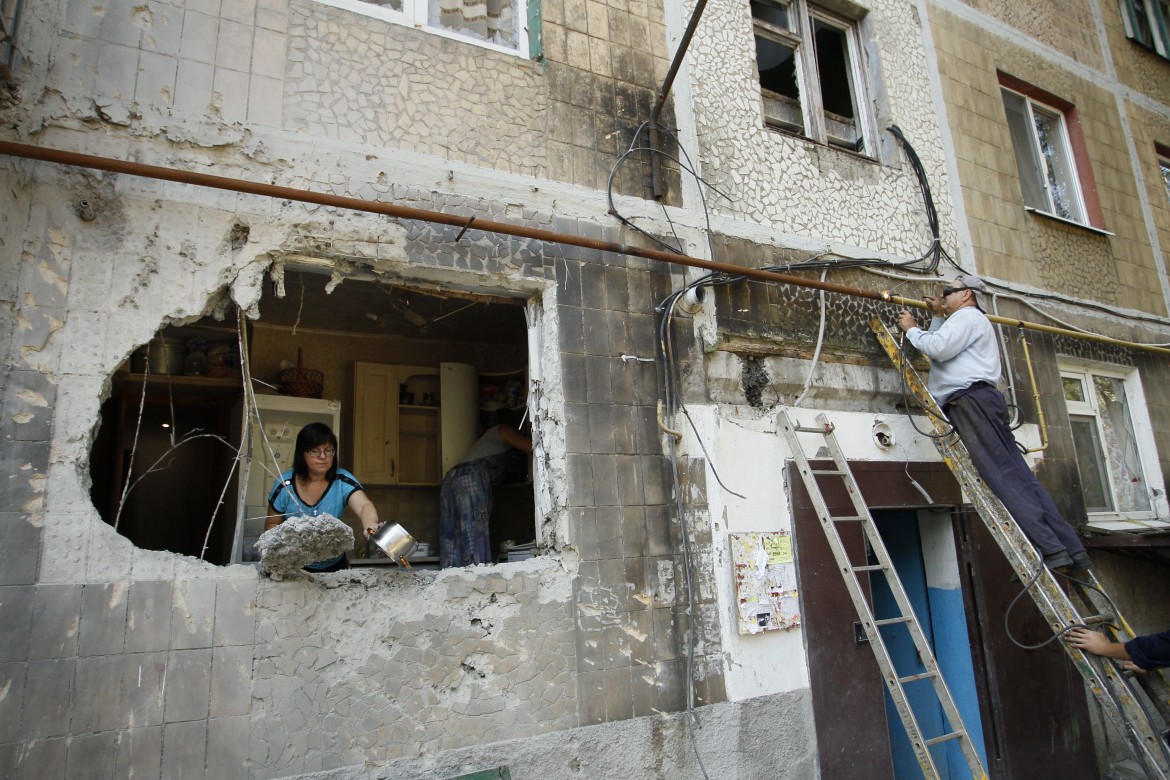Reportage
A currency devalued and workers crushed by poverty
The Ukrainian hryvnia has lost 15 percent of its value, workers are too poor to risk going on strike and only 1 percent earn enough money to save. Nearly half of Ukrainian workers spend all their money on food.

It is a clear morning in Kiev, and the thermometer shows -12 degrees Celsius. Svetlana, 40, is waiting in front of the factory—a subsidiary of a well-known American multinational company producing women’s underwear—where she has worked for many years.
“How much do I earn per month? Seventy-five euros. We are basically working per piece, because if the monthly production goals are not met we have to do unpaid overtime.” This is one story among many similar ones in this poor country, crushed by penury, where the local currency—the hryvnia—has lost 15 percent of its value over the last three months on the currency exchanges, because the central bank says it has run out of reserves to prop it up.
“The situation at that factory is well known,” they tell us at the trade union headquarters. “Unfortunately,” the union official adds, “there is still a two-year moratorium in effect on inspections of companies in Ukraine. So our hands are tied.”
Svetlana and her husband, who works as a security guard, have even stopped taking the public bus to work. Spending 50 cents for a return ticket is too much for them. “I also had to kick my smoking habit,” Svetlana says. And she is still one of the lucky ones: she is working legally, not paid under the table like some of her friends, so she qualifies for a poverty benefit of 45 euros per month. The union has calculated that the minimum wage for not ending up below the poverty line in Kiev is at least €350 per month. In reality, the average wage at the end of 2016 was just €190.
It is interesting to look at how this situation is being perceived by Ukrainian workers. According to a recent survey by the Institute of Sociology of the National Academy of Sciences of Ukraine, 54 percent of workers consider their condition “average,” 43 percent would say they are “poor,” and only 3 percent claim they are “indigent.” But another question on the survey illustrates clearly what “average” actually means for a Ukrainian: 45 percent of respondents say that they spend all their earnings on food, only 1 percent claim to be able to make savings, and 47 percent have difficulties paying for medical care.
“Just between you and me,” they tell us at the union headquarters, with bitter smiles, “we also have much bigger problems than Svetlana’s. It often happens that wages go unpaid for many months. In the mining and metalworkers’ sector, this is normal.” The unions still exist in Ukraine, and they are often active and fighting, but the workers rarely heed the call to strike. Losing what little income they have would throw them into a frightening abyss.
Valia, 54 years old, a work colleague of Svetlana’s, welcomes us into her public housing apartment at the outer limits of the city. In the dining room of the small flat, which she shares with her daughter, a souvenir from Venice is on proud display. “I went there by bus in 2012, when the hryvnia was worth four times as much as it is today.” Those were the days of the Yanukovych government, the pro-Russian president who was later overthrown by the Euromaidan movement. “He was a thief as well,” Valia says,” but it was much better then than it is now.” Soon, Valia will go into retirement. “They will give me €40 per month. I’m already looking for some work,” she says.
She doesn’t even want to hear anything about politics. But she has her view on the war in the Donbass region: “Poroshenko and Putin are making war to make their oligarchs even fatter, and we are the ones dying. But these secessionists, I don’t like them. They want to go away from us. What’s wrong with us Ukrainians? Do we have the plague or something?”
If politics has been generally discredited, the most discredited of all are the old parties of the Left and the idea of socialism. According to the aforementioned poll, of the respondents who consider themselves to be left leaning, only 1.4 percent have confidence in the Communist Party (compared with 4.2 percent of all those interviewed), and only 7.1 percent say they have socialist ideals (compared to 9.2 percent of all respondents).
Valia’s daughter will soon be 17, and she dreams of Europe, Germany in particular. For now, she works as a salesperson in a shoe store, and sometimes she gets called in to model for ads for a cosmetics company. “We’re all going to go away from this country. Nobody will stay here,” she says, sure of herself, while evening falls in Kiev.
Originally published at https://ilmanifesto.it/moneta-svalutata-e-lavoratori-schiacciati-dalla-poverta/ on 2018-01-25
